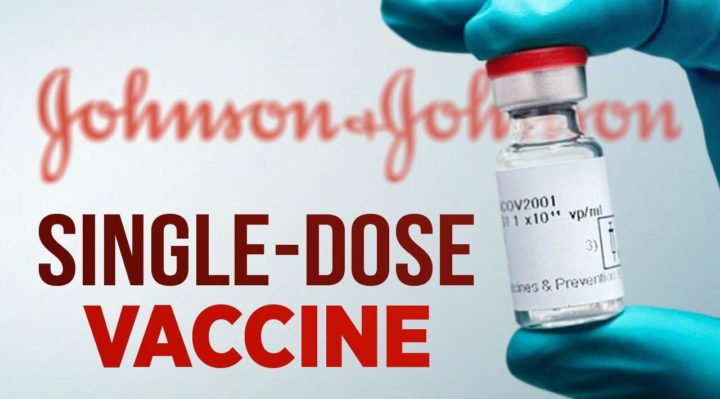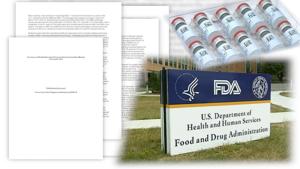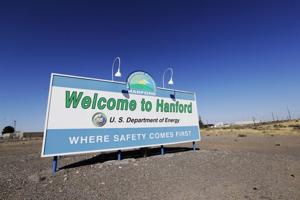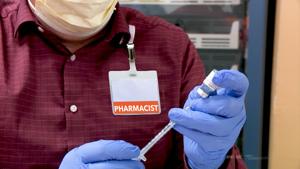
ATLANTA — Three leading health organizations say stronger efforts are needed to collect and report race and ethnicity data about Americans receiving COVID-19 vaccinations.
That information was missing in almost half of vaccination records reported in the first month to the U.S. Centers for Disease Control and Prevention, according to an open letter from the American Medical Association, the American Nurses Association and the American Pharmacists Association.
“This information will allow our nation to better understand whether we are providing access to vaccines to vulnerable populations and inform efforts to improve vaccine confidence,’’ the letter said.
“We encourage clinicians to share with patients in a transparent and culturally sensitive manner why collecting race and ethnicity information can help improve the health of their families and communities,” the groups said. “These actions reinforce our commitment to high-quality equitable care.’’
———
THE VIRUS OUTBREAK:
— AP source: Merck to help produce Johnson & Johnson vaccine
— Vatican defends pope’s trip to Iraq, stadium mass for 10,000 people
— Chinese vaccines sweep across the world, despite some concerns
— Pandemic frustrations fuel attacks on health care workers around the world
— Follow AP’s pandemic coverage at https://apnews.com/hub/coronavirus-pandemic, https://apnews.com/hub/coronavirus-vaccine and https://apnews.com/UnderstandingtheOutbreak
———
HERE’S WHAT ELSE IS HAPPENING:
AMSTERDAM — The European Medicines Agency says it will hold a meeting on March 11 to evaluate whether the single-dose coronavirus vaccine made by Johnson & Johnson should be authorized across Europe.
The Amsterdam-based drug regulator said an opinion could be issued on March 11 “provided that the data submitted on the quality, safety and efficacy of the vaccine are sufficiently robust and complete.”
Three other COVID-19 vaccines have already been licensed in the European Union, those made by Pfizer, Moderna and AstraZeneca, all of which require two doses. Despite having ordered hundreds of millions of vaccines, the EU is struggling to vaccinate its population quickly and has fallen behind other countries including Britain, the U.S. and Israel.
The U.S. Food and Drug Administration granted the J&J shot the green light on Saturday, saying the vaccine offered strong protection against hospitalization and death. One dose appeared to be about 85% protective in a massive study that included participants in South Africa, where a variant is spreading.
———
PHOENIX — Arizona’s coronavirus death toll surpassed 16,000 on Tuesday as the state reported 81 more deaths and 849 confirmed infection cases. The daily increase in newly confirmed cases was the smallest in three months.
The latest figures reported by the state Department of Health Services increased the state’s pandemic confirmed totals to 818,670 cases and 16,080 deaths.
The rolling average of daily new cases dropped from 2,245 on Feb. 15 to 1,192 on Monday and the rolling average of daily deaths declined from 131 to 79 during the same period, according The COVID Tracking Project data.
On Monday, 1,202 COVID-19 patients occupied Arizona hospital inpatient beds, the lowest number since Nov. 7 and down from the pandemic high of 5,802 set on Jan. 11. The state currently operates vaccination sites in Phoenix and Tucson.
———
ATHENS, Greece — Greece has recorded a new spike in coronavirus infections, nearly half of which were recorded in the greater Athens region where hospital intensive care units are quickly filling up.
Health authorities on Tuesday reported 2,353 new confirmed infections in the past 24 hours, bringing the total to nearly 200,000. It was the highest number of new daily infections since December. Another 23 deaths were recorded, with the overall confirmed death toll at 6,557 in the country of 10.5 million.
More than 90% of ICU beds for COVID-19 patients in the greater Athens area are now occupied.
Meanwhile, the government’s inoculation drive is proceeding with nearly 1 million doses of the vaccine administered so far.
———
VATICAN CITY — The Vatican is defending Pope Francis’ decision to go ahead with his trip to Iraq this weekend despite rising coronavirus infections there and concerns about crowds wanting to see him.
The Vatican says health care precautions are being taken and the trip is an “act of love for this land, for its people, and for its Christians.”
Francis is due to visit Iraq Friday through Monday in his first foreign trip since the start of the pandemic. He plans to celebrate a Mass for an expected 10,000 people in the sports stadium in Erbil.
Coronavirus cases have spiked in the past month in Iraq and infectious disease experts say a high-profile trip by a world leader to a country with a fragile health care system is not a good idea.
Vatican spokesman Matteo Bruni was asked why the trip couldn’t be postponed a few months. Bruni noted Iraq has a predominantly young population, the number of infections was small compared to the overall population and papal events will follow Iraqi health protocols. Those include limited participation and social distancing.
———
BRUSSELS — A Belgium virologist says the country is facing the threat of a major third spike in COVID-19 cases, based on a rise in hospitals admissions.
Steven Van Gucht of the scientific government institution Sciensano says “there is clearly a risk that this is the start of a third wave.”
He says infections in the past days had risen by as much as 25 percent. He added hospital admissions rose quickly to 204 people last Friday, after numbers hovered around 100 to 150. In the past month, patients in intensive care had risen to 410 from about 300.
The government will assess on Wednesday whether to give the AstraZeneca vaccine to people over 55. Recent studies though have indicated shots could be used on all age groups.
Coronavirus restrictions have been in place since November, including mandatory mask wearing outdoors, night-time curfews, limits on shopping and a ban non-essential travel.
There’s been more than 22,000 confirmed deaths from the coronavirus in Belgium, which has a population of 11.5 million.
———
JAKARTA, Indonesia — Indonesia reported the first cases of the British variant of the coronavirus.
Indonesian Deputy Health Minister Dante Saksono says there are two cases found in the world’s fourth most populous country.
Indonesia announced 5,712 new daily cases, bringing the confirmed total to 1,347,026. The total number of confirmed deaths reached 36,518.
National COVID-19 Mitigation Task Force spokesperson Wiku Adisasmito says cases are decreasing in Indonesia with the enforcement of public activity restrictions in Java and the Bali islands.
———
WASHINGTON — A Biden administration official says drugmaker Merck will help produce rival Johnson & Johnson’s newly-approved coronavirus vaccine.
The official spoke Tuesday on the condition of anonymity ahead of an official announcement.
The announcement comes as the White House looks to speed the production of the single-dose vaccine. Officials have said J&J faced unexpected production issues with its vaccine and only produced 3.9 million doses ahead of its receiving emergency use authorization on Saturday. The company says it is on pace to deliver 100 million doses by the end of June.
The assistance from Merck was expected to help J&J meet its production commitments and expand supply even further.
President Joe Biden is set to highlight the development in a speech Tuesday afternoon.
———
NEW DELHI — An estimated 10 million people in India have registered to get vaccinated since the country expanded its vaccination drive beyond health care and frontline workers on Monday.
India’s health ministry says 5 million registrations had been recorded in an online system for registrations, and on average each registration is for two people to get the shots. In the past 24 hours, India has vaccinated more than 200,000 people who are above the age of 60 or have underlying medical conditions.
Since January, India has administered over 14.8 million doses of vaccine. More than 6.7 million health workers and 5.3 million other frontline workers have received the first dose of the vaccine. Nearly 2.6 million health workers have received both doses, the health ministry says.
In the past two weeks, cases have increased in several states after months of decline. Scientists are concerned about variants of the virus.
———
LONDON — A key researcher behind the AstraZeneca vaccine says he hopes data from England demonstrating the shot’s effectiveness in older adults will ease concerns in European countries that have been slow to roll out the vaccine.
Data from England’s mass vaccination program showed that both the AstraZeneca and Pfizer vaccines were around 60% effective in preventing symptomatic COVID-19 in people over 70 after a single dose, according to an analysis released late Monday by the country’s public health agency. It also showed that both vaccines were about 80% effective in preventing hospitalization among people over 80.
Professor Andrew Pollard, the lead researcher in clinical trials of the AstraZeneca vaccine in conjunction with Oxford University, told the BBC, “whether you’ve had a Pfizer vaccine or the Oxford-AstraZeneca vaccine, you have very high levels of protection.”
Public Health England released the results of the study to the public ahead of publication in a medical journal. The study hasn’t been peer reviewed.
———
DAKAR, Senegal — Nearly 4 million doses of the COVID-19 vaccine have arrived in Nigeria’s capital, Abuja.
It’s the third and largest delivery to be made by the global COVAX initiative, which was created to ensure that low- and middle-income countries have fair access to doses.
The COVAX program, which has fall short of its goals to quickly get vaccines to the world’s most vulnerable people, shipped 3.94 million doses of AstraZeneca vaccine manufactured by the Serum Institute of India, from Mumbai to Abuja, according to UNICEF and its partners.
The delivery is part of a first wave of vaccines for Nigeria. On Tuesday, the West African nation recorded 156,017 cases and 1,915 confirmed deaths.
———
SARAJEVO, Bosnia-Herzegovina — Bosnia has received 10,000 vaccines from neighboring Serbia amid a dispute with the international COVAX mechanism over a delay in planned shipments.
Bosnia has threatened to sue the program unless the vaccines arrive as agreed. The country has asked for 1.2 million vaccines that would cover about one third of its population.
Serbia’s populist President Aleksandar Vucic flew to the Bosnian capital of Sarajevo to deliver the shipment of AstraZeneca vaccines to the authorities there. The shots are administered in two doses, so the shipment is enough for 5,000 people. Vucic described the move as an act of solidarity and urged closer cooperation among the Balkan countries.
Serbia started vaccinations in January, mainly with Sinopharm and to lesser extent with Pfizer, Sputnik V, AstraZeneca.
(This item has been corrected to show Bosnia received 10,000 vaccines from Serbia, not 5,000.)
———
ISLAMABAD — Pakistan’s civil aviation authority is extending restrictions on travel from the U.K., South Africa and some other countries until March 14 to avoid the spread of more contagious new coronavirus variants.
The measures were imposed in January after other countries also applied restrictions on travel from Britain and South Africa.
Later Pakistan also imposed similar restrictions on travel from Portugal, Netherlands, Tanzania, Botswana, Columbia, Comoros, Ghana, Ireland, Kenya, Zambia, Brazil and Mozambique. These restrictions are to remain until March 14.
The latest development comes as Pakistan reported 42 additional deaths, increasing the country’s overall COVID-19 toll to 12,938. Pakistan also reported 1,163 new cases.
———
BELGRADE, Serbia — Serbia’s epidemiologists have called for the government to introduce a state of emergency and a strict lockdown to halt a surge in coronavirus infections in the Balkan country.
The numbers of daily new cases have been rising sharply in the nation of 7 million despite a mass inoculation campaign that has reached 1 million people already.
Cchief epidemiologist Predrag Kon on Tuesday told the state RTS television that “we must ban contacts or we will break, and then realize what it means when the health system collapses.”
Health authorities say more than 4,000 COVID-19 patients are hospitalized in Serbia and the country is reporting a few thousand new cases daily. Serbia has recorded nearly 4,500 virus-related deaths.
Experts have blamed the recent surge on parties and nightclubs flouting anti-virus rules as well as on ski resorts that stayed open all winter.
Serbia has vaccinated most people with China’s Sinopharm jabs, followed by Pfizer, Russia’s Sputnik V and recently AstraZeneca.
———
BRUSSELS — The European Commission says nearly 10% of all alerts for dangerous non-food products sold on the EU market last year were related to COVID-19.
The EU’s executive arm released data Tuesday on its alert system designed to take off dangerous items off the market. According to the annual report, 9% of all alerts raised in 2020 were related to coronavirus products, “mostly masks meant to protect but failing to do so.” The commission also mentioned disinfectants containing toxic chemicals or UV sanitizers exposing users to radiation.
In total, there were 161 alerts on masks, 13 alerts on hand disinfectants and 18 alerts on UV lamps. More than 2,200 alerts were exchanged by the 31 participating countries, which led to 5,377 follow up actions — an increase of more than 20%.
Toys were the most notified products ahead of motor vehicles.
———
TAIPEI, Taiwan — China’s vaccine diplomacy campaign has been a surprising success: It has pledged roughly half a billion doses of its vaccines to more than 45 countries, according to a country-by-country tally by The Associated Press.
With just four of China’s many vaccine makers claiming they are able to produce at least 2.6 billion doses this year, a large part of the world’s population will end up inoculated not with the fancy Western vaccines boasting headline-grabbing efficacy rates, but with China’s humble, traditionally made shots.
Amid a dearth of public data on China’s vaccines, hesitations over their efficacy and safety are still pervasive in the countries depending on them, along with concerns about what China might want in return for deliveries. Nonetheless, inoculations with Chinese vaccines already have begun in more than 25 countries, and the Chinese shots have been delivered to another 11, according to the AP tally, based on independent reporting in those countries along with government and company announcements.
———



